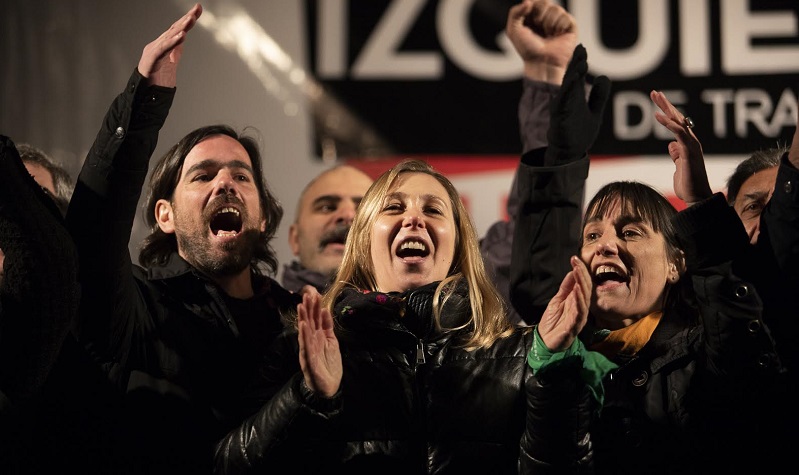On Wednesday evening, thousands of socialists gathered in front of the national congress in Buenos Aires for the final rally of the Workers Left Front (Frente de Izquierda y de Trabajadores, FIT). Argentinians will go to the polls on Sunday for national primary elections, and the FIT is poised to get hundreds of thousands of votes.
The FIT is made up of the Party of Socialist Workers (PTS), the Workers Party (PO) and the Socialist Left (IS). It was recently expanded to include the Socialist Workers Movement (MST), forming the FIT-Unidad. The programmatic basis of the front is summarized in 20 points.
On Wednesday, the main speaker was Nicolás del Caño of the PTS, who is the presidential candidate for the FIT-Unidad. The primary elections this Sunday are for both houses of congress and the presidency. The general elections will take place on October 27.
About the Candidates
Nicolás del Caño, son of Trotskyist militants, was born in Córdoba in 1980. He lived there until 2006, when he moved to Mendoza to build the PTS. In the historic election of 2013, he won a seat as the first-ever congressional representative of the left from Mendoza. And in 2017, he won a seat in congress from the province of Buenos Aires.
As a member of congress, Del Caño presented bills in defense of the working class, the women’s movement and the youth, whose causes he has consistently supported on the streets. In 2017, he fiercely denounced the pension reform bill in congress, but was also out on the streets protesting alongside retirees and trade unionists. Del Caño suffered state repression first-hand and several charges were brought against him. Del Caño is proud to be part of the only group of legislators that fully supports the fight to legalize abortion, a demand that is part of the FIT’s program.
Myriam Bregman, a leader of the PTS, is running for a seat in the Cámara de Diputados (House of Representatives). She is a co-founder of CeProDH, a legal collective in defense of workers’ and democratic rights.
After a term as national representative, Bregman now chairs the Commission against Institutional Violence in the Legislature of Buenos Aires. She is a socialist feminist, an active member of the women’s movement and a leader of the socialist women’s group Pan y Rosas (Bread and Roses). She was also a signatory of the bill to legalize abortion presented by the National Campaign for the Legalization of Abortion.
She has been deeply involved in trials of crimes against humanity, including trials that resulted in the convictions of several generals who were resposible for mass murder under the last dictatorship. She was a lawyer for Julio López, a witness against the dictatorship who disappeared as he was preparing to testify in 2006. She also represents Patricia Walsh in the case of the murder and disappearance of her father, Rodolfo Walsh, in 1977, who had bravely denounced the crimes of the dictatorships. She provides legal advice to workers’ councils and legal support to the occupied factories Zanon and Donnelley.
As a national representative, she presented and supported numerous bills against fare hikes, for the prohibition of layoffs, for the land rights of indigenous people, for emergency measures against gender violence, for the nationalization of natural resources and against the institutional coup in Brazil.
Argentina in Crisis
Since the right-wing president Mauricio Macri took office at the end of 2015, there has been a significant decline in the living standards of the working class.
The value of the US dollar against the Argentine peso has increased fivefold, resulting in price increases of 350 percent in food, medicine and clothing. Fees for water, electricity and natural gas have increased by 3,700 percent, and the country has experienced one of the greatest declines in industrial activity in its history. About 25,000 small and medium-sized businesses have shut down. Unemployment has increased, but so has overtime, as workers seek to work more and more just to survive.
The Macri administration has cut salaries and pensions and eliminated subsidies for the disabled and women’s shelters. Homelessness has increased twofold and entire families have been left out on the streets.
While working people suffer the consequences of this enormous economic crisis, repression has increased against workers who are fighting against layoffs and austerity. This includes the brutal eviction of the striking workers of Pepsico and the murders of Santiago Maldonado and Rafael Nahuel.
In these elections, Macri will face off against Alberto Fernández, whose running mate is the former president Cristina Fernández de Kirchner. Kirchner claims to represent an alternative to the austerity and repression under Macri, but her allies have helped pass all of Macri’s legislation.
The parties that make up the Workers Left Front—Unity have confronted anti-worker policies throughout all these years. In fact the FIT and its elected representatives have been in the front lines of every big workers’ struggle. Throughout Macri’s term, lots of legislators and governors who are now aligned with Kirchner’s opposition voted in favor of passing bills that represented heavy attacks against retirees, the youth and workers’ rights.
A Socialist Solution
In the 2015 elections, the FIT won about 1 million votes (3.23%) with Nicolás del Caño as presidential candidate, and emerged on the national political scene. In the 2017 parliamentary elections, the FIT gained two seats in the national congress and more than a dozen seats in provincial legislatures across the country.
The FIT’s representatives believe that politics should not serve to increase the wealth of a privileged caste at the expense of working people. As a result, they take the equivalent of a teacher’s salary and donate the rest to strike funds.
During the campaign, Nicolás Del Caño said “we are proud to have added new forces to the Workers Left Front—Unity, like the MST, Peoples’ Power and the PSTU. Together we represent more than 90% of the parties of the Argentine left and this is a big step in the process of unification that the FIT-Unidad has been calling for. This new step is essential in confronting the attacks of the IMF, which will only intensify.”
Del Caño also said “our priority is to redirect all of the resources that are currently being used to pay the IMF debt—the capital that is flowing out of the country and into the bank accounts of oil companies—toward the satisfaction of the needs of the working people.” He added “We know that this can only be achieved by the mobilization of the people. This is the only language that the capitalists and their governments understand.”
Myriam Bregman made an impassioned and moving speech at the beginning of the campaign in which she referred to the “green tide”—the movement for the legalization of abortion in Argentina—and the struggle for women’s rights, saying that “we do not separate that struggle from the fight against all oppression and exploitation, because we experience it in our own bodies, because it is part of our history.” And she added that “as socialist feminists, we know that to end patriarchy we must end capitalism.”
Representing the Socialist Feminist Movement
The FIT’s candidates include many women who fight every day against union bureaucrats, women who fight in universities and schools, women who organize in occupied factories, and women who fight for equal pay and equal rights.
There are some “feminist” candidates of the bourgeois parties who have not spoken out against the IMF. They have not been able to explain how they will fight for the legalization of abortion when they are running with candidates who oppose women’s right to choose and are fervent allies of the Catholic Church.
After four years on the front lines of the women’s movement, the FIT has won the support of millions who have taken to the streets. This movement was organized from the grass-roots, driven by mass outrage over femicides and the murder of trans people, the disappearance of girls at the hands of trafficking networks and the deaths of impoverished women in clandestine abortions.
The feminist movement is the great protagonist of our time, having organized mass mobilizations that have changed the political agenda. We continue to fight for these demands during the election season, because young women are still being murdered, because they are still dying in clandestine abortions, because it is women who are the poorest among the poor, who have the most precarious jobs and the lowest wages. For the FIT-Unidad the real “debt” is the one owed to women and their families—not to bankers, businessmen or the IMF.
The candidates of the FIT-Unidad include young people who are organizing to demand sex education and legal abortion, and to defend public schools.
Magali Peralta, for instance, is the youngest candidate running in these elections. She is 18 years old and became involved in politics at the age of 13. Last year she participated in the mass protests for the right to legal, safe and free abortions along with fellow members of the women’s organization Bread and Roses. She is running for legislator of Buenos Aires.
Tomás Mascolo is the only candidate who is a trans man, a fighter for LGBT rights and a journalist for La Izquierda Diario. In his view, it is not enough to assert his identity as a trans man: the question is which political project represents him.
The experience of the FIT-Unidad is a clear example of how an electoral campaign can be about more than just winning some seats. Many people involved in this campaigns got closer to socialist ideas—more than a few joined socialist organizations that fight against capitalism every day. The FIT-Unidad is proof that a socialist organization doesn’t need to water down it’s program to be successful. On the contrary, socialist ideas can be appealing to the working class if they are presented as part of a bold program to solve the ongoing crisis of capitalism.











